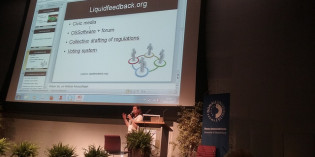
The Government’s new EVEL timeline still isn’t sufficient to facilitate the necessary debate and deliberation
In the immediate aftermath of Scotland’s vote to remain in the United Kingdom, the Prime Minister David Cameron proposed removing the rights of Scottish MPs to vote on ‘English only’ issues – a process which would be contemporaneous with the granting of new powers for Scotland. Katie Boyle argues that there are at least three […]

Was the 2015 election the most disproportional ever? It depends how you measure it
The 2015 election has been described as both one of the most disproportional elections ever and one of the least. Alan Renwick discusses the notion of electoral disproportionality and weighs up the relative merits of the different indexes that have been developed to measure it. Similar Posts16 things you need to know about what will […]

Online communities and the law: how e-participation is changing voting rights
Can digital democracy facilitate the creation of a new, computer-oriented direct democracy? Silvia De Conca argues that some kind of of hybrid system might represent the best way of creating such a system, and that new tools such as LiquidFeedback.org are providing a practical example of how to marry the two approaches. It is now […]

The decision to filter or censor online pornography should be taken by parents and children rather than the state
Societies have been dealing for hundreds of years with the issue of the regulation and accessibility of pornography. But the internet has made it more available and widespread than ever before. The previous and current government make periodic noises about more intrusive web filters and increasing the scope of ‘opt-out’ filters, but Victoria Nash argues, […]

The Government’s narrow EVEL proposals are likely to repeat the mistakes of the past
In the wake of the Referendum on Scottish Independence, the Prime Minister announced that he would be reforming the operation of the House of Commons in order to disqualify Scottish Members of Parliament from voting on legislation deemed to be ‘English only’. On July 2nd, the Leader of the House of Commons Chris Grayling announced […]

Five minutes with Gideon Skinner: “The trend in the polling is clearly toward support for the UK staying in the EU”
What can the polling tell us about the likely result in the UK’s referendum on EU membership? In an interview with EUROPP’s editor Stuart Brown, Gideon Skinner, Head of Political Research at Ipsos MORI, discusses the recent trends in British public opinion, the potential for David Cameron’s intended renegotiation to shape the outcome, and why […]

EVEL intentions, or a necessary solution? Experts respond to the Government’s English Votes for English Laws proposals
The Leader of the House of Commons, Chris Grayling, last week announced the introduction of English Votes for English Laws – a new constitutional settlement to provide an answer to the “West Lothian Questions”. Democratic Audit asked experts Andrew Blick, Louise Thompson, Alan Trench, and Akash Paun to give their take on the proposals. Similar PostsThe […]

Would Brexit spell the end of European defence?
Alongside France, the UK is generally viewed as one of the most important actors in EU defence policy. Karen E. Smith assesses what impact the UK leaving the EU might have in the area of defence. She writes that a Brexit would not spell the end for common European defence as a whole, particularly given […]

The potential for public dialogue and deliberation in the development of national infrastructure policy
Infrastructure spending has come under the microscope recently, with projects like the creation of a new high speed rail line, and the mooted expansion of Heathrow Airport showing the difficulty of persuading everyone of the merit of the project in question. Ian Thompson asks whether it is possible to have genuine public deliberation on a […]

Book Review: Global Democratic Theory: A Critical Introduction
Global Democratic Theory analyses a number of theories related to democracy at different levels of government. Issues of representation of different civil society groups and government accountability are among the main themes. Mehmet Kerem Coban recommends the book “for all readers because we are all affected by ‘democratic deficits’ at various levels of the policy-making process.” […]




 Democratic Audit's core funding is provided by the Joseph Rowntree Charitable Trust. Additional funding is provided by the London School of Economics.
Democratic Audit's core funding is provided by the Joseph Rowntree Charitable Trust. Additional funding is provided by the London School of Economics.